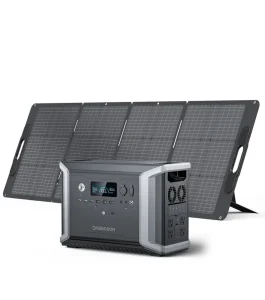How long a battery-powered generator will last The lifespan of a battery-powered generator depends on a multitude of factors, such as what type of battery the unit contains, how frequently it is used and whether or not regular maintenance has been performed. Lithium-ion batteries typically are often used in these systems, because the output remains high over many cycles. These generators usually last for 500 to 2,000 charge cycles, depending on the model and how they are used. A charge cycle means using a battery from full charge to flat. A generator with a life expectancy of 1,000 cycles (used weekly) may last for approximately 20 years — all things being equal.
Battery capacity will also be a significant factor when determining lifespan. With Lithium Ion batteries, they slowly lose capacity with each charge cycle, That means a 1000Wh battery powered generator would give you more like 1000wh when it's new and down to about 800wh after several hundred cycles. That said, the best generators will hold up to 80% of their capacity even after 500 charging cycles, so they should still work in the long run.
Taking care of your battery can save from spending thousands again for the next use. Proper storage in a cool, dry place saves wear and tear on the battery, as does avoiding full discharges if you can. Many owners will also suggest charging the generator to 80% or so versus 100% as it is perceived to help battery life overall. Also, if the generator is not used often, it should be recharged every 3-6 months to keep the battery from going bad.

A big advantage of battery powered generator compared to their traditional gas-powered models is the minimal maintenance they require. In comparison, gas generators need frequent oil changes, refueling, and maintenance but batteries should only require recharging every few months along with suitable storage. This means they are ultimately more cost-effective in the long run, due to lower overall costs of ownership.
Another critical aspect is Efficiency These energy losses are actually fairly small, due to the fact that they have an energy efficiency rate of around 85%; this means that not very much electricity is lost during charging and discharging. The high efficiency of these generators makes them last longer and work efficiently on essential electrical equipment. This is in comparison to a traditional gas generator, which wastes additional energy as heat and must be maintained far more often — impairing its overall longevity.
In the case of users who rely on backup power for critical devices, a generator will need to have longer useable life. For example, some medical equipment, such as CPAP machines or refrigerators, can demand a lot for an extended time period on a generator; it is crucial to select one that can properly respond to these loads without burning through charge cycles extremely quickly.
One of the observations made by technology entrepreneur Elon Musk is, “The battery revolution will not be complete for at least another 30 years.” His words emphasize the move to battery powered solutions that can provide extended intelligent energy storage over years without making noise, emitting fumes or running long periods of maintenance like generator rental.
The top end of a battery powered generator can be made to last for 20 years, but under normal use and maintenance you should reasonably expect about 5 – 10 years out of the product. With a long life span, low maintenance requirements and high efficiency, hybrid generators are becoming more useful for both everyday use and during an emergency.
